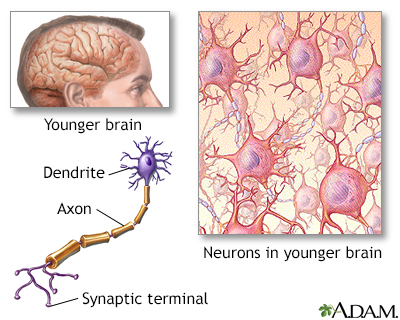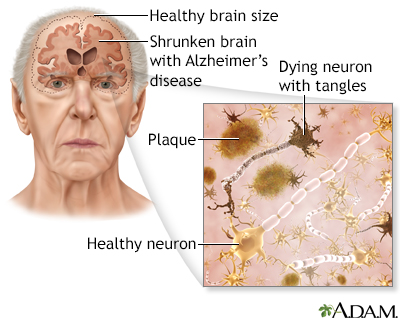Aging changes in the nervous system
Images


I Would Like to Learn About:
Information
The brain and nervous system are your body's central control center. They control your body's:
- Movements
- Senses
- Thoughts and memories
They also help control the organs such as your heart and bowels.
Nerves are the pathways that carry signals to and from your brain and the rest of your body. The spinal cord is the bundle of nerves that runs from your brain down the center of your back. Nerves extend out from the spinal cord to every part of your body.
AGING CHANGES AND THEIR EFFECTS ON THE NERVOUS SYSTEM
As you age, your brain and nervous system go through natural changes. Your brain and spinal cord lose nerve cells and weight (atrophy). Nerve cells may begin to pass messages more slowly than in the past. Waste products or other chemicals such as beta amyloid can collect in the brain tissue as nerve cells break down. This can cause abnormal changes in the brain called plaques and tangles to form. A fatty brown pigment (lipofuscin) can also build up in nerve tissue.
Breakdown of nerves can affect your senses. You might have reduced or lost reflexes or sensation. This leads to problems with movement and safety and makes it more likely to suffer falls.
Slowing of thought, memory, and thinking is a normal part of aging. These changes are not the same in everyone. Some people have many changes in their nerves and brain tissue. Others have few changes. These changes are not always related to the effects on your ability to think.
NERVOUS SYSTEM PROBLEMS IN OLDER PEOPLE
Dementia and severe memory loss are not a normal part of aging. They can be caused by brain diseases such as Alzheimer disease, which doctors believe is associated with plaques and tangles forming in the brain.
Delirium is sudden confusion that leads to changes in thinking and behavior. It is often due to illnesses that are not related to the brain. Infection can cause an older person to become severely confused. Certain medicines can also cause or complicate this.
Thinking and behavior problems can also be caused by poorly controlled diabetes. Rising and falling blood sugar levels can interfere with thought.
Talk with your health care provider if you have any changes in:
- Memory
- Thought
- Ability to perform a task
Seek medical help right away if these symptoms occur suddenly or along with other symptoms. A change in thinking, memory, or behavior is important if it is different from your normal patterns or it affects your lifestyle.
PREVENTION
Mental and physical exercise can help your brain stay sharp. Mental exercises include:
- Reading
- Doing crossword puzzles
- Stimulating conversation
Physical exercise promotes blood flow to your brain. It also helps reduce loss of brain cells.
OTHER CHANGES
As you grow older, you will have other changes, including:
References
Basco MD, Gorgon EJ, Barredo R, Schulte OJ, Stephens J, Ann J. Aging, dementia, and disorders of cognition. In: Lazaro RT, Reina-Guerra SG, Quiben MU, eds. Umphred's Neurological Rehabilitation. 7th ed. St Louis, MO: Elsevier; 2020:chap 27.
Knopman DS. Cognitive impairment and dementia. In: Goldman L, Cooney KA, eds. Goldman-Cecil Medicine. 27th ed. Philadelphia, PA: Elsevier; 2024:chap 371.
Martin J, Li C. Normal cognitive aging. In: Fillit HM, Rockwood K, Young J, eds. Brocklehurst's Textbook of Geriatric Medicine and Gerontology. 8th ed. Philadelphia, PA: Elsevier; 2017:chap 28.
Sowa GA, Weiner DK, Camacho-Soto A. Geriatric pain. In: Benzon HT, Raja SN, Liu SS, Fishman SM, Cohen SP, eds. Essentials of Pain Medicine. 4th ed. Philadelphia, PA: Elsevier; 2018:chap 41.
Williamson T, Massie L, Karikari I, Shaffrey CI, Abd-El-Barr MM. Differential diagnosis of spinal disease. In: Winn HR, ed. Youmans and Winn Neurological Surgery. 8th ed. Philadelphia, PA: Elsevier; 2023:chap 311.
BACK TO TOPReview Date: 7/15/2024
Reviewed By: Frank D. Brodkey, MD, FCCM, Associate Professor, Section of Pulmonary and Critical Care Medicine, University of Wisconsin School of Medicine and Public Health, Madison, WI. Also reviewed by David C. Dugdale, MD, Medical Director, Brenda Conaway, Editorial Director, and the A.D.A.M. Editorial team.

Health Content Provider
06/01/2025
|
A.D.A.M., Inc. is accredited by URAC, for Health Content Provider (www.urac.org). URAC's accreditation program is an independent audit to verify that A.D.A.M. follows rigorous standards of quality and accountability. A.D.A.M. is among the first to achieve this important distinction for online health information and services. Learn more about A.D.A.M.'s editorial policy, editorial process and privacy policy. A.D.A.M. is also a founding member of Hi-Ethics. This site complied with the HONcode standard for trustworthy health information from 1995 to 2022, after which HON (Health On the Net, a not-for-profit organization that promoted transparent and reliable health information online) was discontinued. |
The information provided herein should not be used during any medical emergency or for the diagnosis or treatment of any medical condition. A licensed medical professional should be consulted for diagnosis and treatment of any and all medical conditions. Links to other sites are provided for information only -- they do not constitute endorsements of those other sites. © 1997- 2025 A.D.A.M., a business unit of Ebix, Inc. Any duplication or distribution of the information contained herein is strictly prohibited.
